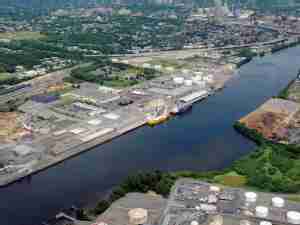Durbin, the No. 2 Democrat in the Senate, said the outlook for the nation's busiest waterway looked positive after he toured a shallow stretch for nearly an hour by boat.
Shippers have been worried for months that the river will close due to historically low water levels following the worst drought in more than half a century. Industry groups, such as The Waterways Council and American Waterways Operators, predict an effective halt to commerce later this month.
Durbin and other officials took to the water for a firsthand look near Thebes, Illinois, where workers have been removing river-bottom rocks to aid transportation after the drought drained the Mississippi River and the rivers that feed into it.
"They are making good progress in clearing that section of the river, which presents the biggest challenge," Durbin said in a phone interview. "The pool of water is sufficient to move all of the barge traffic that they need."
Should the river be shut to traffic, more than 8,000 jobs would be affected, worth $54 million in wages and benefits, according to the shipping groups. It would halt the movement of 7.2 million tons of commodities worth $2.8 billion, they said.
The threat has attracted attention from the highest levels, and the U.S. Army Corps of Engineers for the second time in a month briefed Durbin in Illinois on the potential for a river shutdown. Durbin, a Democrat from the state, receives regular updates on the situation via telephone and in Washington, D.C., a spokeswoman said.
The Corps gave "a very positive briefing," he said, noting that melting ice and snow from recent storms should help feed the river, which is used to transport grains from the Midwest farm belt to the U.S. Gulf Coast for exports, and shipping imports to various parts of the Untied States.
Durbin said the White House has said "any option is on the table" to keep the river open to commerce if water levels continue to drop.
Shipping groups have called on U.S. President Barack Obama to release water from reservoirs into the Missouri River to boost water levels on the Mississippi River. The Missouri River feeds into the larger river near St. Louis
"So far we haven't had to press that case," Durbin said about the shippers' request. "If it reaches an emergency situation, everything will be considered."
Threatening Rock
The Army Corps said last week that navigation would continue. A spokesman could not immediately be reached on Monday.
The Corps is removing the most threatening rock pinnacles near the Illinois towns of Grand Tower and Thebes, planning to deepen the shipping channel by about two feet by mid-January, just before the river is forecast to hit critically low levels.
AEP River Operations, a barge company, has started moving more of its vessels north on the river toward Thebes because the forecast for two more feet of depth has improved prospects for free-flowing traffic, said Martin Hettel, senior manager of bulk sales for the company.
Formerly the company had largely kept vessels south of Thebes due to concerns the river may effectively shut to commerce.
"It looks like we're out of the woods," said U.S. Rep Bill Enyart, D-Ill., who toured the river with Durbin.
The Corps has also been dredging various soft-bottom sections of the river nearly round-the-clock for six months to maintain a deep enough shipping channel. The majority of commercial vessels need a depth, or draft, of at least nine feet so shippers are closely monitoring river gauges and forecasts.
Still, shippers are "looking for that certainty" that the river will stay open beyond the end of the month, said Ann McCulloch, director of public affairs and communications for the American Waterways Operators.
The Mississippi River gauge at Thebes rose to 4 feet on Monday fr









